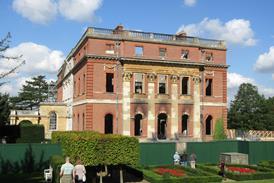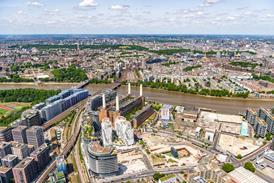There will be opportunities from leaving the EU, architect predicts
Norman Foster has said architects need to put Brexit behind them and move on.
The founder of Foster & Partners said firms had to turn the UK’s impending withdrawal from the EU into an opportunity – rather than “regret” the decision to leave.
Foster, who said was in the Remain camp, added: “I think the bigger picture of change is one of cycles and once a political decision like that is made in a democratic society one may agree or disagree or welcome it or regret it – I’m in the camp that regrets it – but on the other hand if that’s the democratic decision then you get on with it and you optimise on that.”
The firm employs 1,250 staff from more than 70 countries at its London studio in Battersea with the make-up split around a third each between the UK, EU and the rest of the world.
Now the UK has triggered Article 50 – the mechanism for a country to leave the EU – Foster said Brexit would be seen by historians as “another ripple of change” – but one the UK will cope with.
He added: “If as an architect I’m an optimist, I would like to think that, given the perspective of time, if you turn every circumstance into an opportunity then I don’t see any reason why it just doesn’t become another blip in evolution.
“I think a lot of these things at the time when they’re happening are given the passage of time they recede, they become another ripple of change and I think we have to see this not as an end but a new beginning.”
Last month Foster’s said it had laid off a number of staff – thought to be less than 100 – from its London office but Foster said Brexit was not responsible.
“It’s in the nature, regrettably, of architectural practises that you’re inevitably at the receiving end of tendencies which ripple around the world,” Foster said.
“It’s the last thing ever that you want to see happen, but the reality is that you are subject to those economic changes and you see projects which go on hold…I would say that it’s not Brexit, it’s much wider, but then in a connected world where everything’s connected you can’t really say what triggers what.”
He added: “The good news is that we’re fortunately diversified in so many different locations so the impact is minimised in our terms.”
Less than 10% of the firm’s £250 million-plus workload comes from the UK, according to its latest report and accounts.
Foster on tall buildings: ‘Total absence of planning’
Norman Foster has said a lack of a coherent planning strategy has led to London’s tower boom.
The latest report by New London Architecture on the number of buildings over 20 storeys planned for the capital rose to 455 last year from the previous year’s 436.
Foster said he was a fan of towers but added: “There’s now pretty much a total absence of planning, so you have individual boroughs that act in isolation from other boroughs and therefore an absence of an overall strategy is one of the manifestations of seeing towers where you would expect to see them and also perhaps seeing towers which are less predictable.”
Towers, he said, were “a barometer of an economic reality – it’s the manifestation of it - and in that sense it’s the constant of change”.
He added: “The reality is that for many people the tower is liberating, it offers them a view, it offers them a contact with the world that they would not otherwise have in another kind of building.”
But he admitted the quality of towers often varied. “If you analyse the cross section of any city you are going to find some outstanding buildings you’re going to find some which are very average and you’re going to find some which may eventually be overtaken by events and replaced.”













2 Readers' comments